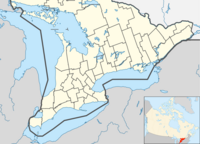Campbellcroft, Ontario
| Port Hope | |
|---|---|
| Municipality (lower-tier) | |
| Municipality of Port Hope | |

Town hall
|
|
| Coordinates: 43°57′N 78°18′W / 43.950°N 78.300°WCoordinates: 43°57′N 78°18′W / 43.950°N 78.300°W | |
| Country |
|
| Province |
|
| County | Northumberland |
| Formed | 1789 |
| Named for | Henry Hope |
| Government | |
| • Type | Township |
| • Mayor | Bob Sanderson |
| • Federal riding | Northumberland—Peterborough South |
| • Prov. riding | Northumberland—Quinte West |
| Area | |
| • Land | 279.03 km2 (107.73 sq mi) |
| • Urban | 12.97 km2 (5.01 sq mi) |
| Population (2011) | |
| • Municipality (lower-tier) | 16,214 |
| • Density | 58.1/km2 (150/sq mi) |
| • Urban | 12,230 |
| • Urban density | 942.9/km2 (2,442/sq mi) |
| Time zone | EST (UTC-5) |
| • Summer (DST) | EDT (UTC-4) |
| Forward Sortation Area | L1A |
| Area code(s) | 905, 289 and 365 |
| Website | www.porthope.ca |
Port Hope is a municipality in Southern Ontario, Canada, about 109 kilometres (68 mi) east of Toronto and about 159 kilometres (99 mi) west of Kingston. It is located at the mouth of the Ganaraska River on the north shore of Lake Ontario, in the west end of Northumberland County. Port Hope's nearest urban neighbour (7 km to the east) is the Town of Cobourg, while between them and surrounding Cobourg is the Township of Hamilton. Since 1868, the town has been home to Trinity College School (previously located in Weston, Ontario).
Besides Port Hope other communities within the municipality include: Campbellcroft, Canton, Dale, Davidson's Corners, Decker Hollow (ghost town), Elizabethville, Garden Hill, Knoxville, Morrish, Osaca, Perrytown, Port Britain, Rossmount, Thomstown, Welcome, Wesleyville (ghost town) and Zion.
Ganaraska was attributed to the area by the First Nations natives of the region and is what they called the river that flows through the town. The name originates from Ganaraske, the Cayuga village first located at the current townsite. The Cayuga, part of the Iroquois Confederacy, had migrated there from New York in 1779, after suffering extensive damage as British allies at their homeland in New York state during the American Revolution.
In 1793, United Empire Loyalists became the first permanent settlers of European heritage in Port Hope, which they called Smith's Creek after a former fur trader. Mills and a town plot were developing by the turn of the century. After the War of 1812, more British settlers were wanted, and a better name was required. After a brief fling with the name Toronto, the village was renamed in 1817 as Port Hope, after the Township of Hope of which it was a part, which in turn had been named for Colonel Henry Hope, lieutenant governor of the Province of Quebec. In 1834 Port Hope was incorporated as a town.
...
Wikipedia

